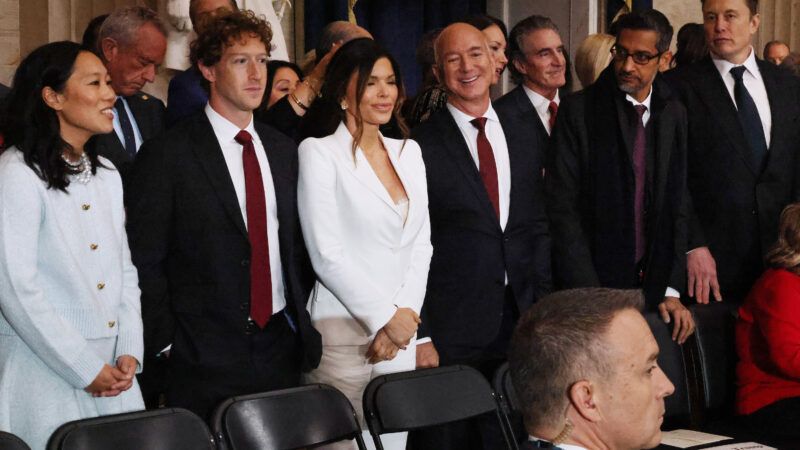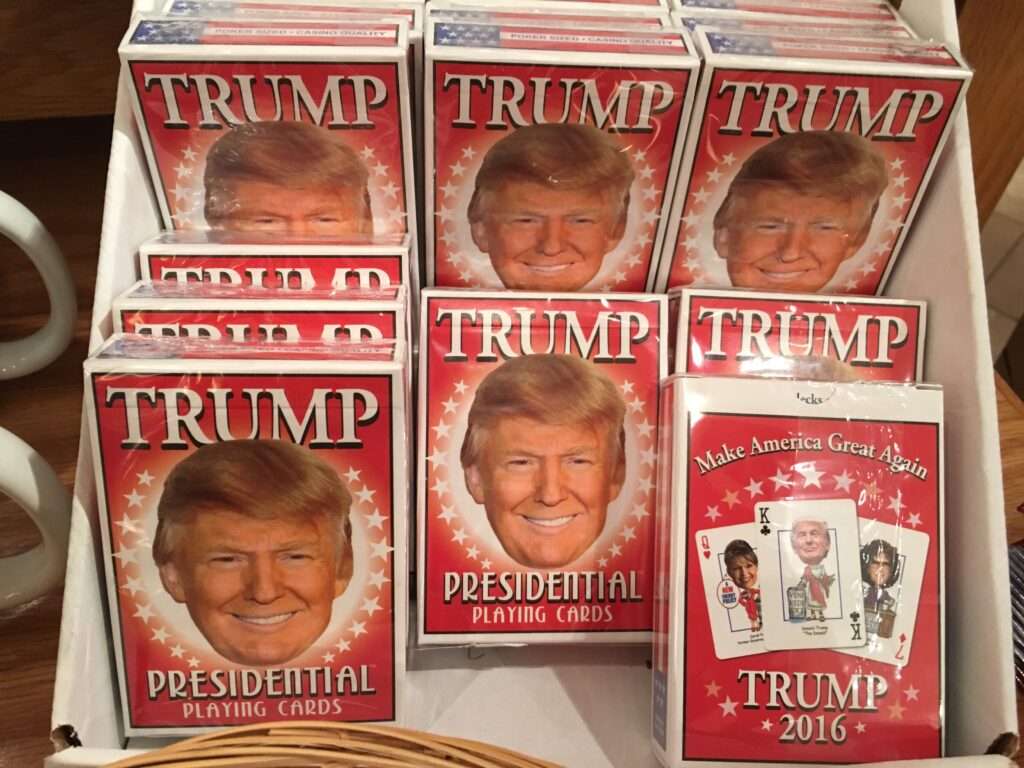Trump's Tech Love Affair Won't Last
Let's enjoy it while we can?

Here we are, three days into the second Trump administration, and the president has already served up ample reminders of what his political reign is like: erratic, unpredictable, sporadically delightful, intrinsically authoritarian, often horrifying, and always a bit weird and confusing. We've yet to see much at all on the sex front (thank goodness), but with tech-related matters, all the typically Trumpian tendencies have been on full display.
You are reading Sex & Tech, from Elizabeth Nolan Brown. Get more of Elizabeth's sex, tech, bodily autonomy, law, and online culture coverage.
Take last night's full and unconditional pardon of Ross Ulbricht, the creator of dark web drug marketplace Silk Road. Ulbricht was sentenced to two life sentences plus 40 years in federal prison for facilitating drug sales through the website. Such extreme punishment "should give pause even to supporters of the war on drugs," my colleague Jacob Sullum suggested.
And when it comes to ardent drug-war supporters, Donald Trump—who has, on numerous occasions, called for drug dealers to be executed—is way up there.
Except when he isn't. Somehow, the same man who has said drug dealers should get the death penalty has also, on numerous occasions, spoken out about the unfair and disproportionate nature of drug crime punishments. He oversaw sentencing reform and commuted the sentence of nonviolent drug offender Alice Johnson. And now, Trump has pardoned Ulbricht, whose Bitcoin- and Tor-driven marketplace undeniably enabled drug peddling and whose charges included narcotics trafficking, distribution of narcotics by means of the internet, and narcotics trafficking conspiracy.
Reminder No. 1: Trump's statements and actions are often contradictory.
Ultimately, Ulbricht's pardon seems to stem from a protracted campaign by libertarians and other supporters to both convince Trump of the injustice of Ulbricht's sentence and connect Ulbricht's plight to Trump's own. In announcing the pardon, Trump said that "the scum that worked to convict [Ulbricht] were some of the same lunatics who were involved in the modern-day weaponization of government against me."
It's great that Ulbricht is free (and that Trump kept his word), but I don't think Trump's decision here tells us anything about how Trump will treat drug crimes or digital marketplaces more generally.
Reminder No. 2: Trump's actions seem driven more by personal relationships and grievances than any underlying philosophy or deep conviction.
Which brings us to TikTok. Trump's recent attempts to save TikTok are a far cry from his actions during his first presidency, when Trump tried to effectively ban TikTok by executive order.
But let's back up. In case you forgot, the Supreme Court declined last Friday to stop the divest-or-ban law that Congress passed last year. TikTok briefly went dark.
Then President Trump declared that he would save TikTok… and also maybe nationalize it? As usual, no one is quite sure what he means.
On Truth Social, Trump seemed like he might be OK with ByteDance retaining partial control of the company so long as the U.S. government also got to retain partial ownership. ("Therefore, my initial thought is a joint venture between the current owners and/or new owners whereby the U.S. gets a 50% ownership in a joint venture set up between the U.S. and whichever purchase we so choose," he posted.) Then, in Oval Office comments to reporters, Trump again floated this "joint venture" idea but made it sound more like the U.S. would merely help broker ByteDance's sale of the company and take a cut of the sale money. He also suggested that the government could still play some undefined role in policing the app.
What does any of that really mean? No one knows! Perhaps Trump himself isn't quite sure. But what is clear is that this is a hallmark of Trump leadership: seemingly off-the-cuff comments that allude to elaborate plans that may or may not be constitutionally sound, may or may not be serious, and may or may not be ever mentioned again.
Reminder No. 3: Not even Trump has any real idea what he's talking about.
Then, on Monday, Trump issued another executive order telling the Department of Justice and state authorities not to enforce the law that would ban TikTok. So TikTok might come out of this OK—but that's a hell of an executive-overreaching way to ensure it.
Reminder No. 4: Trump tends to mix his pro-freedom concerns with authoritarian impulses.
The dizzying nature of Trump's political whims leaves little room for formulating expectations.
What will tech policy be like in the Trump era? I don't think anyone knows.
During his first presidency, Trump was a harsh critic of social media companies, including TikTok. His administration launched antitrust cases against Google and Facebook, which many Republicans saw as being in the tank for Democrats. And Trump frequently lambasted Section 230 of the Communications Act, which protects free speech on the internet by removing some of tech companies' liability for third-party speech.
Now, Trump partially owns a social media platform, Truth Social, and he's besties with Elon Musk, who runs X. Lo and behold, we've heard little about Section 230's flaws lately.
Now the Democrats oppose TikTok, and former President Joe Biden signed a law to force its sale or ban it. Trump responded by positioning himself as TikTok's champion.
Now, tech leaders—seemingly tired of trying and failing to appease Democrats—are trying to cozy up to Trump and Republicans. Musk, Amazon CEO Jeff Bezos, Meta CEO Mark Zuckerberg, and TikTok CEO Shou Zi Chew all attended Trump's inauguration.
Theoretically, this all portends a better tech policy climate under Trump 2.0. And in the immediate future, I think we'll see it. But to believe that it will last, one would have to forget everything we've learned about the erratic, opportunistic, and personality-driven nature of Trumpian politics.
How long until Trump and Musk quarrel and suddenly we're hearing from the White House about how we need to ban algorithms? How long until some Trump-mocking meme trends on TikTok and, you know what, TikTok is a communist propaganda tool after all?
Democrats undoubtedly played politics when it came to tech policy, placating and using tech companies when it suited their agenda and lashing out at them when populism building, crime-panic stoking, or censorship lust demanded it. Democrat-led tech policy was a roller coaster, but one you could see the general contours of, at least. Under Trump, we can expect a different sort of tech policy roller coaster, driven by the politics of personal alliances and grievances, and it's anyone's guess where it's going.
More Sex & Tech News
• Trade associations NetChoice and TechNet are suing the Consumer Financial Protection Bureau (CFPB) and its director, Rohit Chopra, over what they call the agency's "attempted power grab over digital payments." The tech trade groups argue that the CFPB's recent rule regulating digital payment processors—think Venmo, Paypal, Cash App, Apple Pay, Google Wallet, etc.—exceeds its authority and violates the principle of separation of powers. The rule, finalized in November, says the CFPB can conduct "proactive examinations" of these companies to check their compliance with federal privacy and fraud laws.
"This is the second lawsuit related to the regulation," notes The Verge. "Google filed a lawsuit in December after the CFPB placed Google Payment Corp. under federal supervision. In a statement to The Verge, Google spokesperson José Castañeda called the rule 'a clear case of government overreach.'"
• Pregnancy surveillance? The American Civil Liberties Union (ACLU) of Vermont and the advocacy group Pregnancy Justice are suing the Vermont Department for Children and Families, alleging that it "relied on baseless allegations about a pregnant woman's mental health to secretly investigate her and win custody of her daughter before the baby was born," the Associated Press reports.
• South Dakota is advancing an age-verification law for adult websites.
• One of the many executive orders issued by Trump on his first day back in office seems unaware that intersex people exist.
Today's Image



Show Comments (32)